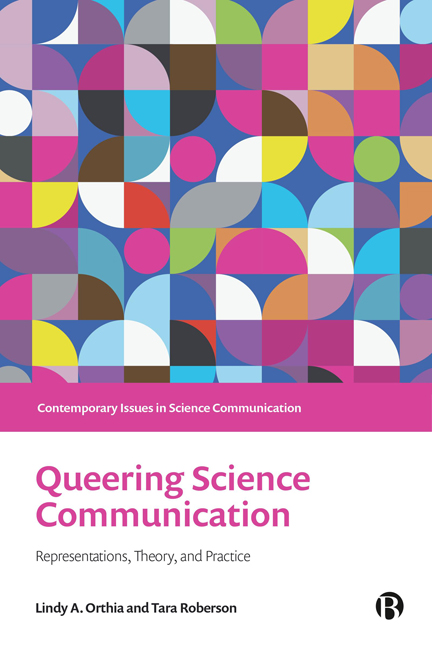Book contents
- Frontmatter
- Contents
- Series Editor Preface
- Notes on Contributors
- Acknowledgements
- Terminology and Sensitive Content in This Book
- Introduction
- PART I Negotiating Queer Identities with Science, Technology, and Medicine
- PART II Representations of Queerness in Public Science Communication
- PART III Queer People in Science Communication Communities
- PART IV Queering Institutional Science Communication Agendas
- Conclusions
- Index
9 - Science OUTreach: A Queer Approach to Science Communication Practice
Published online by Cambridge University Press: 18 January 2024
- Frontmatter
- Contents
- Series Editor Preface
- Notes on Contributors
- Acknowledgements
- Terminology and Sensitive Content in This Book
- Introduction
- PART I Negotiating Queer Identities with Science, Technology, and Medicine
- PART II Representations of Queerness in Public Science Communication
- PART III Queer People in Science Communication Communities
- PART IV Queering Institutional Science Communication Agendas
- Conclusions
- Index
Summary
Introduction
In recent years, forms of public science communication that overtly intersect personal and professional identity have become more commonplace. This intersection represents a rich opportunity to connect science to audiences who have been historically excluded and to experiment with different forms of expression. Of course, efforts to do or share science in cultural contexts that break free of a white, heteronormative, and patriarchal establishment are prone to criticism from those who prefer to propagate these traditions. Of these critiques, perhaps the most perplexing and anachronistic are those that position personal or political narratives at odds with the requirement for ‘objectivity’ in science (Saini, 2020). While objectivity is paramount to the design of reproducible scientific experiments and unbiased interpretation of results, we must recognize that scientists are people shaped by their life experiences. Good research should not require scientists to leave their identity at the laboratory door. This is especially important for people whose identities are not well represented in lab culture.
Mainstream international efforts to include underrepresented people in science first centred on gender equality with the United Nations declaring the first International Day of Women and Girls in STEM in 2015 (United Nations, n.d.). There is much important work to be done to include women in science, but some of these more widely adopted diversity initiatives can leave ‘other aspects of identity side-lined’ (Moore and Nash, 2021, p 4), can perpetuate the myth of a gender binary, and can ultimately be exclusive. Visibility for other groups of people who have been historically excluded from science is growing, however, and has, in some cases, been assisted by campaigns starting on social media that coincide with broader acknowledgements of these communities.
In common with other minority groups, LGBTIQA+ people and concerns are underrepresented in science and science communication research and practice (Roberson and Orthia, 2021). In recent years, there has been a growth in organizations and networks that support queer-identified people working in STEM and international days of celebration or ‘observance’. The inaugural international ‘LGBTQ+ STEM Day’ was held in July 2018 but is now formally ensconced as an annual event on 18 November, a date symbolic of the anniversary of the US Supreme Court fight against workplace discrimination by gay activist and astronomer, Frank Kameny (Stenhoff, 2020).
- Type
- Chapter
- Information
- Queering Science CommunicationRepresentations, Theory, and Practice, pp. 161 - 180Publisher: Bristol University PressPrint publication year: 2023

